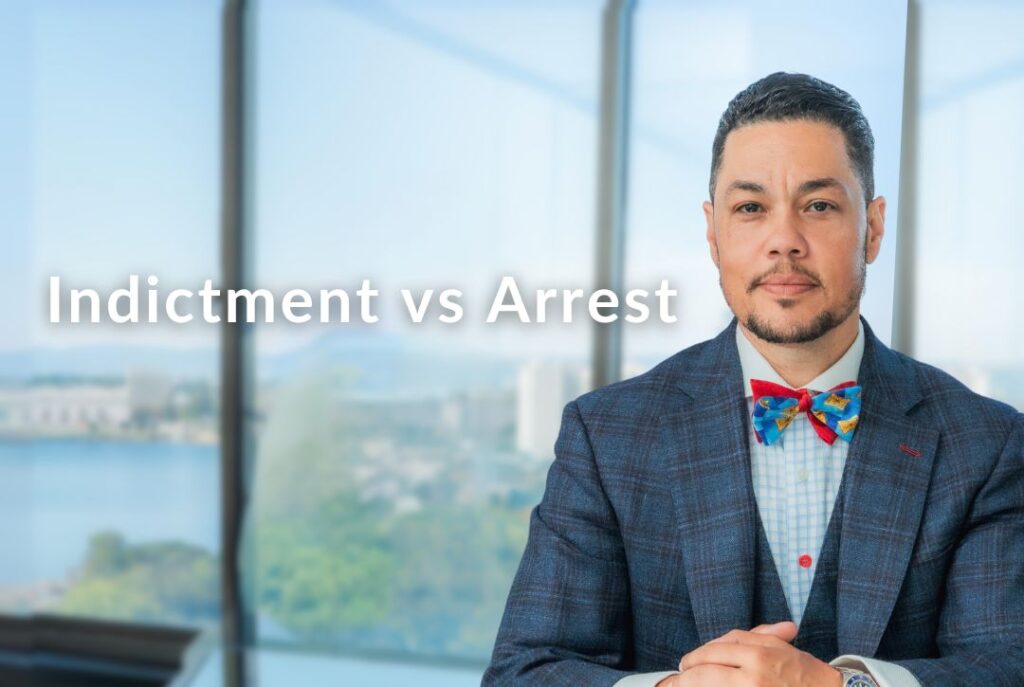Indictment vs Arrest: Understanding Key Differences in Criminal Proceedings
Indictment vs Arrest: Understanding Key Differences in Criminal Proceedings
In criminal proceedings, an indictment is a formal charge issued by a grand jury, while an arrest is the act of law enforcement physically taking someone into custody. Both are key steps in criminal cases, but they serve different roles.
An indictment suggests there’s enough evidence to charge you with a crime, but an arrest can happen based on probable cause alone. Understanding indictment vs arrest is critical, as it affects how the legal process unfolds.
This article explains the core differences and offers guidance on what to expect. Huff Legal is here to help you navigate these complex legal situations.
What is an Indictment?
An indictment is a formal charge issued by a grand jury, indicating sufficient evidence to prosecute someone for a crime. Unlike an arrest, an indictment doesn’t mean immediate custody; it signifies the start of legal proceedings, requiring the accused to appear in court. The grand jury’s role is to review evidence and decide if criminal charges are justified.
Overview of Indictment Proceedings
Indictment proceedings involve presenting evidence to a grand jury, which decides whether to issue a formal criminal charge.
- These proceedings are closed to the public.
- The accused and their attorney are not present.
- Only the prosecutor presents evidence to the jury.
The Grand Jury's Role in Indictments
The grand jury evaluates evidence to determine if there is probable cause to charge someone with a crime.
- They issue a “true bill” or indictment if sufficient evidence exists.
- If not, they return a “no bill,” meaning no charges are filed.
- Grand juries are typically used for serious felony cases.
Indicted vs. Charged: What's the Difference?
Being indicted means a grand jury has found probable cause to formally accuse someone of a crime, whereas being charged typically refers to a prosecutor filing charges directly.
- Indicted: Decision made by a grand jury.
- Charged: Decision made by a prosecutor, often after an arrest.
- Both can lead to criminal trials, but the process differs in how charges are brought.
Request a Free Consultation
What is an Arrest?
An arrest occurs when law enforcement takes a person into custody based on probable cause that they committed a crime. This is typically the first step in the criminal justice process, leading to formal charges.
The Arrest Process Explained
The arrest process begins when a police officer believes there is probable cause to detain a person.
- The person is taken into custody.
- They are read their Miranda rights.
- The individual is booked at a police station and may either post bail or remain in custody until arraignment.
Arrest Warrant vs. Indictment
An arrest warrant is a court-issued document allowing police to detain a suspect, while an indictment is a formal charge issued by a grand jury.
- Arrest warrant: Requires probable cause and is typically sought by law enforcement.
- Indictment: Issued after a grand jury finds enough evidence to charge a suspect.
- Both can lead to arrest, but the processes differ in how the legal authority is granted.
What Happens After an Arrest?
After an arrest, the accused is processed and taken into custody. The next step is the arraignment, where charges are formally presented.
- The accused can post bail (if applicable) and prepare for trial.
- The court will set a date for the preliminary hearing.
- The accused may hire a criminal defense attorney to represent them.
Key Differences Between Indictment and Arrest
While an indictment involves the grand jury’s decision to charge someone, an arrest is the immediate action of taking someone into custody based on probable cause. Both are part of the criminal justice process but occur at different stages.
Charged vs Indicted: Understanding the Legal Distinctions
Being charged means a prosecutor has accused you of a crime, while being indicted means a grand jury has determined there is enough evidence to prosecute.
- Indicted: Issued by a grand jury, often for serious crimes.
- Charged: Filed by a prosecutor based on evidence or police reports.
- Both can lead to legal proceedings, but the mechanisms of accusation differ.
Legal Processes Involved
The indictment process involves a grand jury reviewing evidence while a prosecutor files a charge. After an arrest, the court proceeds with arraignment, pre-trial hearings, and possibly a trial.
- Indictment hearings are not public, while charges are part of open court records.
- Defendants have the right to legal counsel in both cases.
Consequences for the Accused
Both an indictment and an arrest can lead to criminal proceedings, but they differ in legal consequences.
- Indictments usually involve serious charges like felonies.
- Arrests can happen with or without formal charges, depending on the evidence at hand.
- Depending on the outcome of the trial, the accused may face jail time, fines, or other legal penalties.

As Seen On












Indicted vs Charged: Understanding the Legal Nuances
When comparing being indicted to being charged, the distinction lies in who determines if there’s enough evidence to prosecute you. An indictment is a formal charge brought by a grand jury, while being charged means a prosecutor found probable cause. Both lead to criminal proceedings, but the processes differ significantly.
Preliminary Hearings and Charges
A preliminary hearing is a critical stage in criminal cases, particularly when someone is charged by a prosecutor rather than indicted by a grand jury. The prosecutor files charges in a formal document, like a criminal complaint. During the preliminary hearing:
- A judge evaluates whether there is enough evidence to go to trial.
- The defense can challenge the evidence.
- The accused and their attorney are allowed to be present, making it a more open process compared to a grand jury proceeding.
Grand Juries vs. Prosecutor Charges
In an indictment, the grand jury, made up of citizens, reviews the evidence presented by the prosecutor in a closed session. As the accused, you and your attorney are not present during this process. The grand jury decides whether to issue a true bill (indictment) or a no bill (dismissal of charges). This differs from prosecutor charges, where a prosecutor directly files the charges after a police investigation.
- Grand Jury: More common in federal cases and high-profile felonies.
- Prosecutor Charges: Typically used for misdemeanors and less severe felonies.
What Happens After Multiple Charges or Indictments?
Facing multiple charges or indictments can complicate your legal case. For instance, if you are indicted for several crimes or charged multiple times, the consequences become more severe, including:
- Increased bail or difficulty obtaining bail.
- Longer sentences if convicted on multiple charges.
- More complex defense strategies, as your attorney must contest multiple allegations.
Fifth Amendment Protections in Indictment Cases
The Fifth Amendment plays a critical role in the indictment process. It ensures that no individual can be tried for a capital or infamous crime without first being indicted by a grand jury. This protects against arbitrary criminal accusations and ensures a fair trial process.
The Role of the Fifth Amendment
The Fifth Amendment of the U.S. Constitution guarantees several protections, including the right against self-incrimination and the right to due process. In the context of indictments:
- It requires that a grand jury be used to issue indictments for serious crimes.
- It prevents individuals from being held to answer for certain crimes without sufficient evidence presented in a grand jury.
- It upholds the principle of fairness in legal proceedings.
How the Fifth Amendment Protects Defendants
The Fifth Amendment allows defendants to refuse to testify if their testimony could incriminate them. In indictment cases, this protection can:
- Safeguard against coerced confessions.
- Ensure the right to remain silent during interrogations or trials.
- Require the prosecution to present strong evidence before a grand jury can indict you, helping prevent wrongful accusations.
What Clients Say About Us





Schedule Your Free Consultation Today
Navigating the Legal Landscape: What to Expect
Navigating a criminal case, whether from an indictment or a charge, can be overwhelming. Understanding the legal steps and securing the right defense is essential for protecting your rights.
Securing Legal Representation
When facing an indictment or a charge, your first step should be securing an experienced criminal defense attorney. A skilled lawyer can:
- Review the evidence and challenge weak points in the case.
- Guide every stage, including grand jury hearings or preliminary hearings.
- Negotiate plea deals or argue for reduced charges.
Defense Strategies for Indictments and Arrests
Your defense strategy depends on the nature of the indictment or charge. Common defense strategies include:
- Challenging the evidence: Questioning the validity of the prosecutor’s evidence in the preliminary hearing or grand jury.
- Arguing a lack of intent: Demonstrating that the crime was accidental or not premeditated.
- Pleading the Fifth: Protecting yourself against self-incrimination during the legal process.
Having a defense lawyer is crucial to ensure you are treated fairly and have the best chance at a favorable outcome.
Frequently Asked Questions (FAQ)
Is being indicted the same as being arrested?
No, being indicted is not the same as being arrested. An indictment is a formal charge issued by a grand jury, while an arrest involves being taken into custody by law enforcement. Depending on the case, you can be arrested before or after an indictment.
What does it mean when someone is indicted vs arrested?
When indicted, a grand jury finds probable cause to formally charge the accused with a crime. An arrest happens when law enforcement takes someone into custody based on probable cause or an arrest warrant. Both can occur at different stages of a criminal case.
Can someone be indicted without being arrested?
Yes, an individual can be indicted without being arrested. An indictment is a formal charge by a grand jury, while an arrest is the physical act of being taken into custody. If law enforcement has not yet apprehended the person, they can be indicted without an immediate arrest.
What's the difference between a charge and an indictment?
A charge is a formal accusation made by a prosecutor that someone has committed a crime. An indictment is a formal charge issued by a grand jury after reviewing evidence. Both lead to legal proceedings, but the processes to reach these outcomes differ.
How does the Fifth Amendment protect me during an indictment?
The Fifth Amendment protects you by ensuring you cannot be forced to testify against yourself during criminal proceedings. It also guarantees the right to a grand jury before you can be tried for serious crimes. This prevents arbitrary indictments and ensures due process.
Protect Your Rights with Huff Legal
Understanding the complexities between indictments and arrests can feel overwhelming. Huff Legal is here to provide personalized legal defense and guidance during your criminal case.
Whether you’ve been indicted or arrested, our experienced team will fight for your rights and craft a defense strategy tailored to your situation.
Contact us today for a free consultation and ensure your rights are protected every step of the way.
LET HUFF HELP YOU
As a former police officer and patrol supervisor and his time spent as a United States District Court Judicial Law Clerk to the Chief Judge, Attorney Huff knows how to navigate all levels of the complex criminal law system. We also have more than 55 years of combined experience dealing with various complex criminal legal matters and have helped just over 1,500 clients over the past few years.
Why Huff Is Your Best Option For Criminal Defense
55+ Years of Combined Experience
At Huff Legal, we have more than 55 years of combined experience dealing with complex criminal legal matters, which can oftentimes be quite challenging. In order to get the outcome you deserve, you need a team of experienced attorneys on your side, who can help you navigate the legal system, so you can move past this situation and focus on the life ahead of you!
5 Star Rating on Google
We have a proven track record of success and are dedicated to our clients’ best interests. If you’re looking for a law firm that will always have your back, look no further than Huff Legal. Just have a look at some of our amazing client reviews over here!
1,500+ Happy Clients
Over the years, we’ve had the privilege of helping over 1,500 clients with their legal needs. When you work with us, you can be confident that you’re getting the best possible legal representation. We’re proud of our track record and our reputation for being a firm that delivers great results.
What Our Clients Say About Us


Sheila


Abel Resendiz


Manuela Frazier


Doris
Contact Huff Today
Request A Free Consultation
* Free consultations only available for Criminal Defense


In legal terms, an accessory to murder refers to an individual who aids, abets, or otherwise assists in committing a murder. While the specifics may vary across jurisdictions, California law treats accessories to murder as active participants in the crime, holding them accountable for their actions. In San Francisco Bay Area, there are two primary types of accessories to murder:
In the event that you find yourself in the Bay Area facing accessory to murder charges, you should first call a criminal defense attorney who can help you defend your rights and lessen the effects of the investigation. Contact an attorney at Huff Legal as soon as possible following your arrest. An accomplished attorney from Huff Legal will thoroughly examine your case, who will then develop a strategy and build a defense.
